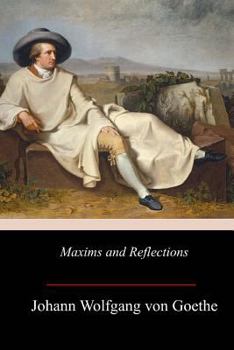Maxims and Reflections
Select Format
Select Condition 
Book Overview
Throughout his long, hectic and astonishingly varied life, Johann Wolfgang von Goethe (1749-1832) would jot down his passing thoughts on theatre programmes, visiting cards, draft manuscripts and even... This description may be from another edition of this product.
Format:Paperback
Language:English
ISBN:1547294310
ISBN13:9781547294312
Release Date:June 2017
Publisher:Createspace Independent Publishing Platform
Length:78 Pages
Weight:0.26 lbs.
Dimensions:0.2" x 6.0" x 9.0"
Related Subjects
Fiction History Literary Criticism Literary Criticism & Collections Literature & FictionCustomer Reviews
4 ratings
The Father of German Romanticism
Published by Thriftbooks.com User , 18 years ago
Johann Wolfgang von Goethe (born Aug. 28,1749,Frankfurt am Main-died March 22,1832,Weimar,Saxe-Weimar). German poet,novelist,playright and natural philosopher.His chief masterpiece,the philosophical drama FAUST (Part 1,1808;Part 11 1832) concerns the struggle of the soul for knowledge,power,happiness and salvation.Maxims and Reflections is a collection of thoughts and observations, covering a wide variety of subjects.His thoughts on ethics,literature,art and the natural sciences are portrayed in 6 Sections. 1-FROM ELECTED AFFINITIES (1809),FROM ART AND ANTIQUITY IN written from 1818-1827,FROM THE PERIODICAL ISSUES ON MORHOLOGY(1822),FROM THE PERIODICAL ISSUES ON THE NATURAL SCIENCES(1823),FROM WILHELM MEISTER'S JOURNEYMAN YEARS(1829),And POSTHUMOUS.There are 1,413 maxims and reflections from the one of the giants of world literature.It's pocket size. Short, sweet and expressive obervations on life in an eloquent and laconic style.I carry it with me everywhere. here is a little taste: "...hatred is active displeasure,envy is passive,hence one not be suprised when envy turns into hatred..." #247 from ART AN ANTIQUITY "...a merry companion is like a cart to give us a lift along our way..." #236 from ART AND ANTIQUITY "...when a rainbow last more than a quarter of an hour,we stop looking at it...#161- From ART AND ANTIQUITY
Nietzsche and Goethe as aphorists
Published by Thriftbooks.com User , 19 years ago
Goethe is solid and sane, often commonplace and down- to- earth. His wisdom does not strike you suddenly like Kafka's definition of poetry an axe breaking through the frozen sea- within. Nietzsche one of the greatest of aphorists surprises, outrages, shocks and wakens you. His aphorisms are read and reread whereas Goethe's maxims are a minor part of his oeuvre. Perhaps this says something about the very nature of the ' aphorism' about the need for to strike us with a force calm serene Olympian Goethe- like wisdom lacks.
Essential reading (but this translation is not too good)
Published by Thriftbooks.com User , 22 years ago
I say this is essential reading, but this is more true for someone familiar with Goethe. This is not to say that the casual reader will not find something of value, but 'Maxims and Reflections' is as much a reflection of Goethe and what he held true and interesting, as it is a collection of "wise sayings."I think it would be helpful to a potential reader to review here some of the Maxims and Reflections, with comments.Some are simplistic: "Behaviour is a mirror in which everyone shows his image."Some are interesting, and one will see the truth in them upon some reflection. These may not really educate, but they are interesting in themselves: "There is something horrifying about a man of outstanding excellence of whom stupid people are proud."Some are statements of what most of us would agree with easily, but they are important because they shed light upon the man and his concerns. For example, we often see how concerned he is with certain kinds of people being dangerous: "Fools and intelligent people are equally undamaging. Half-fools and half-sages, these are the most dangerous of all."Some are incomprehensible: "Work makes the journeyman."Some are enigmatic, at least to me: "Wisdom is to be found only in truth."Some are observations that are not too profound but which will serve as food for thought: "Human nature needs to be numbed from time to time, but without being put to sleep; hence smoking, spirits, opiates."Some are simply personal beliefs, and we need to know that Goethe beleived such-and-such a thing: "Painting and tattooing the body is a return to animality."Some are profound truths or observations, and will serve as food for a lot of thought: "Time is itself an element." "Mysteries do not as yet amount to miracles." "Truth is contrary to our nature, not so error, and this for a very simple reason: truth demands that we should recognize ourselves as limited, error flatters us that, in one way or another, we are unlimited." In this last one, for example, we get an idea about the kind of simple, pragmatic reasoning the great man often employed.Some are statements by others, in other languages, and it is an interesting exercise to try and see why the great man included these in the Maxims and Reflections: " L'amour est un vrai recommenceur. [Love is truly a new beginning.] "Some are classic maxims, which are oft-quoted, even today: "There is nothing more dreadful than active ignorance." This example also serves to show that the translation is really bad in places: that phrase *really* deserves to be translated "ignorance in action".And some are difficult to comprehend - but when makes the effort, they turn out to be absolute gems: "The first and last thing demanded of genius is love of truth."
Aphoristic Genius
Published by Thriftbooks.com User , 24 years ago
This small book has held more inspiration and caused me to pause and reflect more than any other I have read. I find myself circling the number preceding the most poignant passages so I can return to them at a later time of need. It is as essential as the works of the great philosophers.






